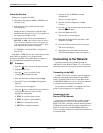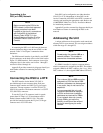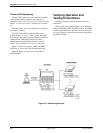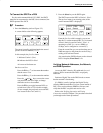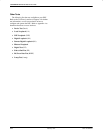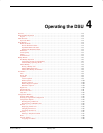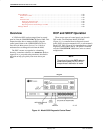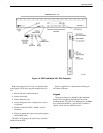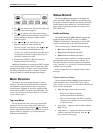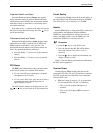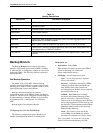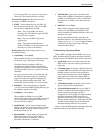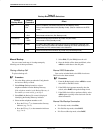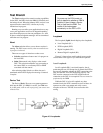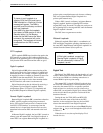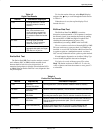
COMSPHERE 3550 Series Data Service Units
4-4 February 1995 3550-A2-GB20-10
F1 F2
F3
• The key returns you to the top-level menu, and
terminates any work in progress.
• The
key returns you to the previous display,
one level up from the current display. It can also be
used to terminate a data entry display without
making a change.
• The
and keys scroll menus or other
displays to the left or right, respectively.
On status and test result displays, the
and
keys scroll additional information into view.
On data entry displays, these keys move the cursor
one character to the left or right to allow entry of
one digit or character at a time.
• Function keys (F1, F2, or F3) select the item
displayed directly above the key.
Additional information on operating the DSU’s keypad
can be found in the procedures used to install and verify
operation of the DSU in Chapters 2 and 3, the procedure
for editing configuration options in Chapter 5, and the
various procedures scattered throughout this chapter.
Menu Structure
The menu is your map through the DSU’s various
functions. The following sections describe each branch
and subbranch, and provide procedures for operating
certain features. Appendix A shows the complete menu
and describes the DSU’s branches and subbranches. (The
menu is also included on the handy Reference Card that
comes with this guide.)
Top-Level Menu
The top-level menu is the starting point for all DSU
operations. You can always return to this point from
anywhere in the menu by pressing the
key. Pressing
this key immediately terminates any operation or work in
progress. Refer to Appendix A as you read about the
branches and subbranches.
Status Branch
The Status (Stat) branch reports on the health and
status of the DSU, DBM, TDM/Flex, the DTE interface,
the quality of the dial connection, the identity of the DSU
(model number, serial number, etc.), and the terminal’s
power (where it checks the presence of voltage on the
DTE’s RTS lead).
Health and Status
The Health and Status (H/S) subbranch displays the
health and status of the DSU, as well as a DBM or
TDM/Flex, if installed. It automatically scans for DSU
and line conditions that are not within normal limits.
There are three types of Health and Status messages:
• Devic (Device Health and Status)
• Expan (Expanded Health and Status)
• Subn (Subnetwork Health and Status)
All alarm and status conditions are displayed for the
specified DSU at the time the option is selected. For a
local DSU, the alarm and status conditions are updated
every 2 seconds; for a remote DSU, the alarm and status
conditions are not updated.
Refer to Appendix C for a complete listing of these
messages.
Device Health and Status
Device Health and Status (Devic) reports health and
status information for a selected DSU. If five minutes
elapse without a key being pressed, the Device Health and
Status screen is redisplayed.
• When the digital circuit is the active link,
— The first line displays a running
normal-operation timer (hh:mm:ss).
— The second line displays the DSU’s operating
rate and can also display one or more of the test
or alarm messages.
• An asterisk ( * ) appears at the far right to indicate
NMS activity.
• A right arrow (→) appears just before the asterisk
if there is more than one message. Press the
key to see the next message.



